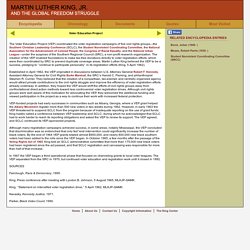

Images. Instructions. Keywords. James Meredith 1963 - Segregation at Universities. James Meredith was to make his name in civil rights history by being the first African-American to attend the University of Mississippi.

James Meredith, by simply doing this, was putting his life on the line. Meredith was born in Kosciusko, Mississippi, on June 25th, 1933. From 1951 to 1960 he served in the American Air Force. After this, Meredith studied at Jackson State College for two years. Following this, he applied to start a course at the University of Mississippi. The issue did not end there – if anything, the whole controversy was inflamed still further when state officials and students at the university voiced their opposition to Meredith being given a place there. Regardless of this, Meredith attended the university and graduated in 1964. Meredith rejoined the march on June 25th, 1966 after his hospital treatment. Why was it difficult for black Americans to gain equal rights in the USA in the 1950s and 1960s?
Voter Education Project 1964. The Voter Education Project (VEP) coordinated the voter registration campaigns of five civil rights groups—the Southern Christian Leadership Conference (SCLC), the Student Nonviolent Coordinating Committee, the National Association for the Advancement of Colored People, the Congress of Racial Equality, and the National Urban League—under the auspices of the Southern Regional Council (SRC), a non-profit research organization.

The creation of the VEP enabled foundations to make tax-free donations directly to voter registration efforts, which were then coordinated by SRC to prevent duplicate coverage areas. Martin Luther King believed the VEP to be a success, pledging to ‘‘continue to participate personally’’ in its registration efforts (King, 5 April 1962). Established in April 1962, the VEP originated in discussions between U.S. Attorney General Robert F. Kennedy, Assistant Attorney General for Civil Rights Burke Marshall, the SRC’s Harold C. Fairclough, Race & Democracy, 1995. Voting Rights Act 1965. Lyndon Johnson assumed the presidency in November 1963 upon the assassination of President John F.

Kennedy. In the presidential race of 1964, Johnson was officially elected in a landslide victory and used this mandate to push for legislation he believed would improve the American way of life, such as stronger voting-rights laws. After the U.S. Civil War (1861-65), the 15th Amendment, ratified in 1870, prohibited states from denying a male citizen the right to vote based on “race, color or previous condition of servitude.” Nevertheless, in the ensuing decades, various discriminatory practices were used to prevent African Americans, particularly those in the South, from exercising their right to vote. During the civil rights movement of the 1950s and 1960s, voting rights activists in the South were subjected to various forms of mistreatment and violence. In the wake of the brutal incident, Johnson called for comprehensive voting rights legislation.
1968 Civil Rights Act (Fair Housing Act) Despite Supreme Court decisions, including Shelley v. Kraemer (1948) and Jones v. Mayer Co. (decided in June 1968), barring the exclusion of African Americans or other minorities from certain sections of cities, race-based housing patterns were still in force by the late 1960s, and those who challenged them often met with resistance, hostility and even violence. Meanwhile, while a growing number of African-American or Hispanic members of the armed forces fought and died in Vietnam, on the home front their families had trouble renting or purchasing homes in certain residential areas because of their race or national origin.
In this climate, organizations such as the National Association for the Advancement of Colored People (NAACP) the G.I. The proposed civil rights legislation of 1968 expanded on and was intended as a follow-up to the historic Civil Rights Act of 1964.